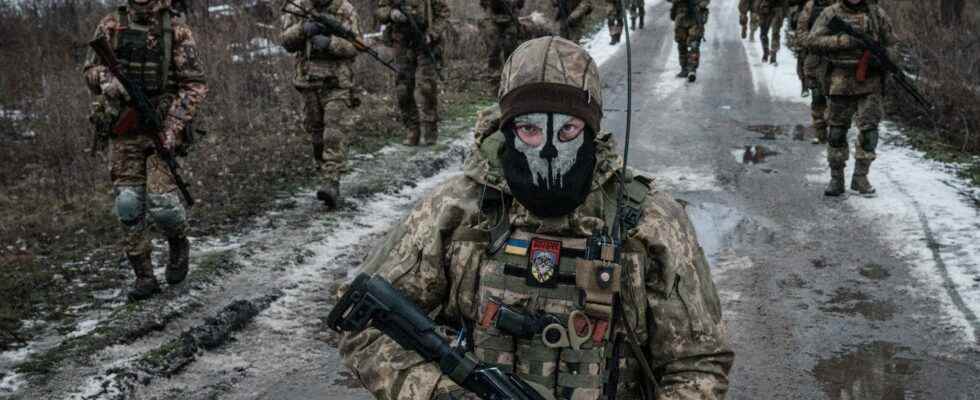“War, politicians say, is back in Europe.” Europe, to speak with Kissinger, unfortunately still does not have a telephone number, and our knowledge of the war is most often bookish, barely touching our skin. These specters emerging from a tomb that was thought to be definitive, we must face them eye to eye. We must remember that Europe is not an administrative abstraction, but these plains, these rivers, these towns and villages which all look familiar to us, and these beings whose language we do not understand, but whose language we guess the soul. It must also be borne in mind that the war has turned these plains into peat bogs ripped open by trenches, rivers into front lines where snipers lie in wait, these villages into ruins reeking of death, where women wander looking for their children. She made ordinary people soldiers of a freedom that is also ours. This is the first meaning of Slava Ukrainian, documentary by Bernard-Henri Lévy : teach us to open our eyes again.
But looking is not enough. We must embrace this misery and this ugliness of war. You have to gorge yourself to the point of disgust with these vitrified landscapes, kiss these bodies bearing the marks of misfortune under low skies, you have to get dirty and exhausted, be cold with the Ukrainians, suffer with them, and also, above all, hope like them. Lévy’s wandering on the front lines encountering lost battalions, scorched lands, anonymous heroes, is the salutary attempt to make us touch with our too delicate fingers the rotten flesh of war, to make us sniffing the wounds whose pestilence does not quite pierce our comfort.
Never, no doubt, has Lévy filmed and recounted distress and death with such harshness, such implacable crudity, and bare, and black. Admittedly, focusing on filming “war without loving it” (as he often says), he once feverishly reported on other conflicts, other horrors. But this time, it’s not that he films the war without liking it – it’s that he vomits it, this war, it comes out of him through all the pores of his skin, because of what it has had to absurd and abject. From devastated Karkhiv where he comes across a red-haired woman barely out of the cellar where she was holed up accompanied by a child who no longer speaks, to Izium where the mass graves disgorge their corpses, from Bakhmout crushed by rockets to the icy trenches of Sloviansk, from the devastated land of Lyman to the disastrous Kherson, it leads us to the heart of a fire that did not light the frenzy of men, but the madness of one: Putin.
The factory of misfortune
The hand of the Russian leader is everywhere visible in this nation-wide factory of misfortune. Wide-eyed, as if incredulous in the face of the devastation caused even among his own troops by the hubris of the tyrant, Bernard-Henri Lévy tracks down the effects of this neurosis everywhere: the widespread fear, the rage to destroy, and, of course, infinitely , this injustice done to the humble and the innocent, who do not understand, and have only to oppose it with tears and arms. On the features of Lévy himself, it is not only the fatigue of bumpy roads and short nights that one surprises, but at the corner of the lips the fold of a bitterness, and sometimes the heaviness of an eyelid. on the eye that has seen too much.
On the banks of the Dnieper, here he is breathing the calm air of peace. But it is immediately to regain the agonizing grip of drones or, tomorrow, submarines prowling to kill. We feel good, to follow in his footsteps, those of Gilles Hertzog, of Marc Roussel, that we ourselves are slipping into depression. The bravery of those driven by the ardent desire to win is not enough to pull us out of it. It is precisely the salutary value of this film to have wanted this descent into the abyss, to not spare us the foul potion – and to remind us that this is the acrid taste of war, that it is this nausea, and not the simple geostrategic concern of the commentators.
For us to reach the whiffs of this sanity, Lévy and his traveling companions had to go to the heart of the fire, and put their skin in the balance. In the trembling of the images, in the bleached tone of the narrator, passes the shiver of who has come back from afar, that is to say from where we Europeans would never have thought of having to return; but where, perhaps, if Ukraine is defeated, we will be doomed to return. These dirty fumes, these black waters, these twisted corpses, these haggard women, will then be the spectacle of our streets and our countryside. May the unbearable weight of blood and pain that this powerful film bears remind us of that, and – if we have the souls strong enough to learn its lesson – save us from it.
“Slava Ukraini,” in theaters February 22.
